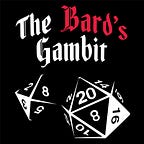Galaxy-Brained Difficulties
It happens to the best of us. We find this cool new tabletop RPG we want to play, so we get all the dice and books, we gather up a group of people to play by telling them how cool it looks, and then…
No one wants to play it, because it’s in a setting no one really ‘gets.’
This is a problem I’ve seen with a lot of RPGs, but the biggest casualties always seems to be space-fairing games. For most genres we have a lot of cultural context for the tropes. Especially when it comes to “Western” fantasy, which has relied on the same grab bag of monsters and tropes since the early days of the genre. Orcs and Goblins and Trolls are all so ubiquitous in modern culture that even people who don’t consume any media directly know what you’re talking about when you bring them up.
But space-faring fantasy? No one has any idea what to do with it, because there’s just too much to do with it. A lot of systems have decided to just throw fantasy tropes into space alongside some science fiction tropes, and it really doesn’t work, such as in Starfinder by Paizo. They transplanted a lot of the fantasy species and ideas into space alongside ideas from anything they could find. The end result is some sort of weird mash-up of Star Wars, Dungeons and Dragons, and HP Lovecraft, which is as weird as it sounds, but not quite as fun.
Other attempts to make space-faring tabletop games attempt to ground themselves in existing settings. The Star Trek and Star Wars RPGs are likely the most prominent examples, but they come with the baggage of being tied to an existing franchise, which limits what players feel like they could do with the setting. Could players run a Star Wars game in which they raid the Fire Plane to steal advanced technology for the good of the Republic? Sure. Are they? Probably not, because their imagination is bound to the existing world-building by the nature of the game.
Another option is to just make something completely alien and unknown, but that comes with a caveat baked into it: You’re building something alien, and alien can be hard to sell to a wide market. If your players have to sit down and read a novel before they can understand what your setting is about, then they may be turned off. On the other hand, if your setting is too simple, people will lose interest in it because it isn’t alien enough, whether they know it at the time or not. It’s hard to find that sweet middle ground between the alien and the familiar that can draw players in without pushing players out.
Until very recently, that is.
With Narrative/Actual Play podcasts and streams becoming easier and easier to create, we’re starting to see a very interesting strategy for getting around the alienation issue: Just make the alien familiar. There are a great many in-the-works space-faring fantasy games that are seeing initial… “Previews,” so to speak, through their streams and podcasts.
Games like Fading Suns have been made just a little bit more familiar now that there are easy to access streams by Iconic Productions that showcase their wonder and intrigue, while giving new ideas on what can be done in those spaces. I myself wouldn’t have given a game like Still Fleet a second thought after hearing about a setting thousands of years in the future where all the planets were connected, but then they weren’t, but then they were again… Until Fun City did an episode of it on their podcast. Now I’m digging up the quick start guide and waiting with bated breath for the full release.
These games are out there, and are starting to find a way to make themselves more and more palatable to an audience hungry for that feeling of the alien but familiar. Soon the only struggle will be reaching a wide enough audience, but that’s a problem as old as creation itself.
Special Thanks to:
AJ
John Beckelhymer
Jonathon Chu
Katie Coker
Tyler Litton
Sara White
Thaddius Goldner
William Moton
Serenity Tomala
Brett Schoonover
Elliot Chapple
